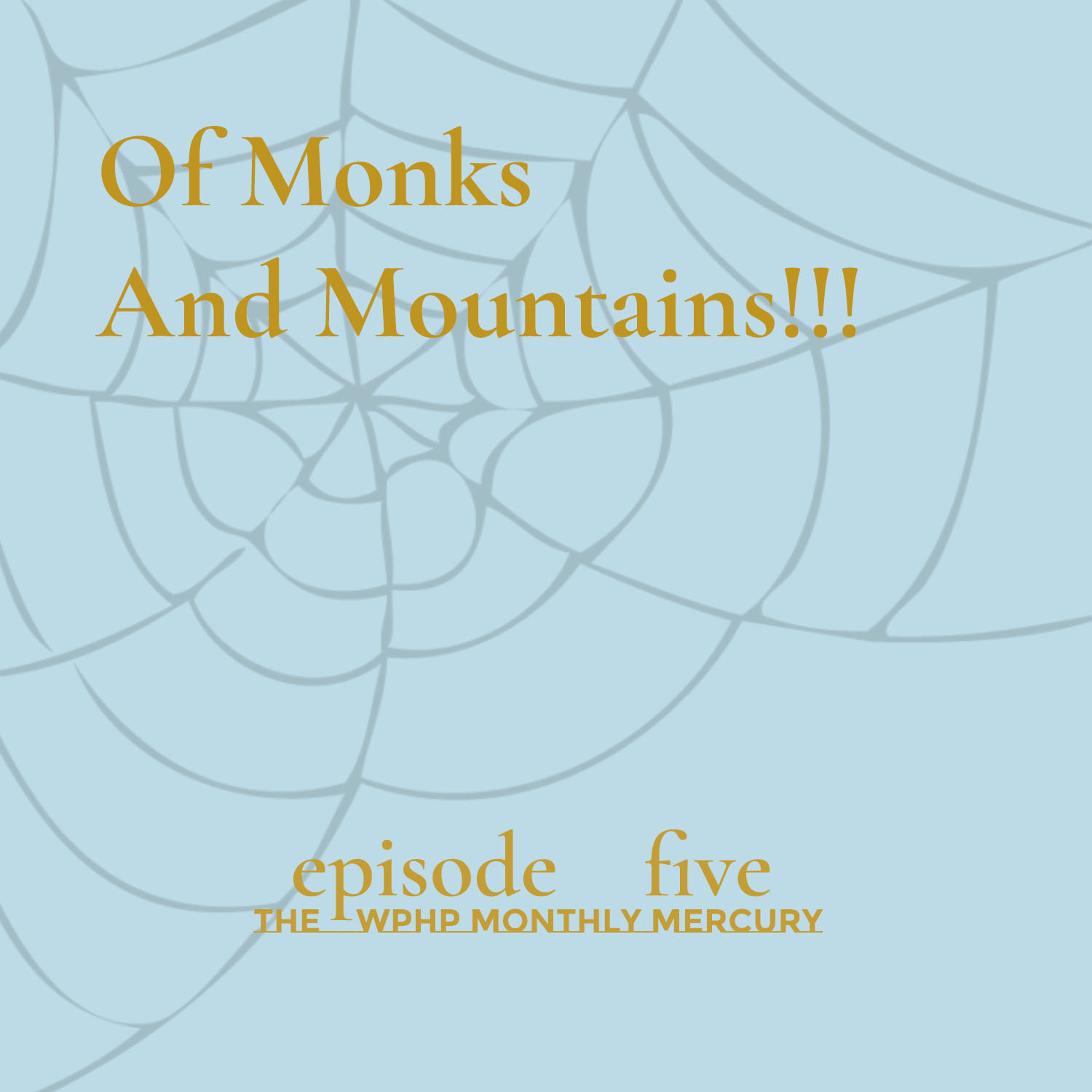
You can listen to Episode 5 of The WPHP Monthly Mercury, "Of Monks and Mountains!!!", on Apple, Spotify, Stitcher, Google Podcasts, and other podcast apps, available via Buzzsprout.
Halloween is nearly upon us, and the time has come to gather round the (socially distanced) fire and swap scary stories. In this spirit, hosts Kate Moffatt and Kandice Sharren each chose, for better or for worse, a gothic novel to read from the WPHP: Elisabeth Guénard’s The Three Monks!!! and Catherine Cuthbertson’s Romance of the Pyrenees.* Both published in 1803, these works respond directly to the gothic mode popularized during the 1790s, complete with abducted women, banditti, and buried family secrets.
This month’s episode “Of Monks and Mountains!!!” follows the winding plots and publication histories of these two largely forgotten works, which raise questions about genre, translation, readership, punctuation (!!!), and more. Join us—if you dare.
---
*Please note that Romance of the Pyrenees contains a representation of a character in blackface. Although we touch on it in the episode, we wanted to note it again here, with additional framing. Because this representation predates the widespread practice of minstrelsy that was popularized in the United States and Britain in the 1830s, the novel’s use of blackface is more interpretively unstable than a later representation would be. Scholarly debates about the use of blackface in relation to Frances Burney’s The Wanderer (1814), which opens with its heroine Juliet disguised as a Black woman, offers a useful starting point for understanding how to read Cuthbertson’s use of blackface. For example, whereas Sarah Salih has argued that the revelation of Juliet’s whiteness amounts to “racial erasure—both narrative and literal” (302), Tara Czechkowski posits that “Juliet’s act of racial counterfeiting and her subsequent treatment by other characters allow Burney to deliver in remarkable ways on the implicit promise made at the novel’s start to address the status of expatriated Africans, black Caribbeans, and African Americans in England at the close of the eighteenth century” (678).
For further reading on this topic, the following sources are a good starting point:
Czechowski, Tara. "'Black, Patched and Pennyless': Race and Crime in Burney’s The Wanderer." Eighteenth-Century Fiction, vol. 25, no. 4, 2013, pp. 677–700.
Featherstone, Simon. "The Blackface Atlantic: Interpreting British minstrelsy." Journal of Victorian Culture, vol. 3, no. 2, 1998, pp. 234–51.
Pickering, Michael. Blackface Minstrelsy in Britain. Routledge, 2018.
Salih, Sara. "‘Her Blacks, Her Whites and Her Double Face!’: Altering Alterity in The Wanderer." Eighteenth-Century Fiction, vol. 11, no. 3, pp. 301–15.
Credits
Produced by: Kandice Sharren, Kate Moffatt, and Michelle Levy
Mixed and mastered by: Alexander Kennard
Music by: Ludwig van Beethoven, "Moonlight," Sonata No. 14, in C Sharp Minor, Op. 27, No. 2, arranged by Henle Urtext, and played by Kandice Sharren
WPHP Records Referenced
Cuthbertson, Catherine (person, author)
Romance of the Pyrenees (title)
Austen, Jane (person, author)
Northanger Abbey (title)
Parsons, Eliza (person, author)
Castle of Wolfenbach (title)
The Mysterious Warning (title)
Roche, Regina Maria (person, author)
Clermont (title)
Sleath, Eleanor (author, author)
Orphan of the Rhine (title)
Radcliffe, Anne (person, author)
The Mysteries of Udolpho (title)
The Italian (title)
Guenard, Elisabeth (person, author)
The Three Monks!!! (title)
Sarrett, H.J. (person, author)
Reeve, Clara (person, author)
The Old English Baron (title)
Dacre, Charlotte (person, author)
Zofloya (title)
Godwin, William (person, author)
Wollstonecraft, Mary (person, author)
Thomas Tegg (firm, publisher)
Robinson, Mary (person)
Vancenza (title)
Ann Lemoine (firm, publisher)
Minerva Press (firm, publisher)
Benjamin Crosby and Co. (firm, publisher)
George and John Robinson (firm, publisher)
Works Cited
Batchelor, Jennie. “Finding the Mysterious Miss Cuthbertson in the Lady’s Magazine.” The Lady’s Magazine (1770–1818): Understanding the Emergence of a Genre. University of Kent (blog), 17 April 2016, https://blogs.kent.ac.uk/ladys-magazine/2016/04/17/finding-the-mysterious-miss-cuthbertson-and-the-ladys-magazine/
Clery, E. J. The Rise of Supernatural Fiction, 1762–1800. Cambridge UP, 1995.
"Elisabeth Guénard." Wikipedia The Free Encylopedia. Wikimedia Foundation, Inc., https://fr.wikipedia.org/wiki/%C3%89lisabeth_Gu%C3%A9nard.
Gamer, Michael. Romanticism and the Gothic: Genre, Reception, and Canon Formation. Cambridge UP, 2000.
Garside, Peter, James Raven, and Rainer Schöwerling, eds. The English Novel, 1770–1829: A Bibliographical Survey of Prose Fiction Published in the British Isles, Oxford UP, 2000.
Ledoux, Ellen Malenas. Social Reform in Gothic Writing: Fantastic Forms of Change, 1764–1834. Palgrave Macmillan, 2013.
Further Reading
Clery, E. J. Women's Gothic : from Clara Reeve to Mary Shelley. Northcote House in Association with the British Council, 2000.
Craciun, Adriana. Fatal Women of Romanticism. Cambridge UP, 2002.
Hudson, Kathleen, ed. Women's Authorship and the Early Gothic: Legacies and Imitations. U of Wales P, 2020.
Jacobs, Edward. "Anonymous Signatures: Circulating Libraries, Conventionality, and the Production of Gothic Romances." ELH, vol. 62, no. 3, 2013, pp. 603–29.
Labbe, Jacqueline M. The Romantic Paradox: Love, Violence and the Uses of Romance, 1760–1830. Palgrave Macmillan, 2000.
Neiman, Elizabeth. Minerva’s Gothics: The Politics and Poetics of Romantic Exchange, 1780–1820. U of Wales P, 2019.
Potter, Franz J. The history of Gothic publishing, 1800-1835 : exhuming the trade. Palgrave Macmillan, 2005.
Townshend, Dale, and Angela Wright. Ann Radcliffe, Romanticism and the Gothic. Cambridge UP, 2014.
Wright, Angela. Britain, France and the Gothic, 1764–1820: The Import of Terror. Cambridge UP, 2013.
This podcast draws on research supported by the Social Sciences and Humanities Research Council.
